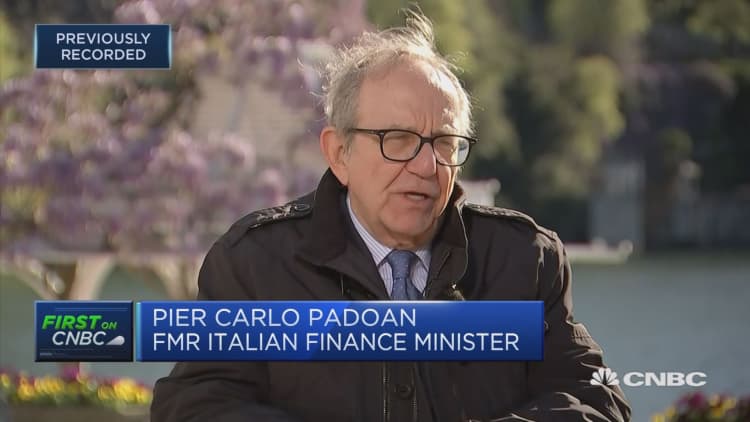The Italian finance ministry is set to release updated fiscal plans Wednesday, with analysts contemplating another dispute with the EU and volatility in the country's bond market.
According to press reports over the weekend, the plans are likely to show a revised 2019 budget deficit and growth of just 0.3% for this year — down from an earlier 1.0% prediction. For 2020, the numbers are expected to show a deficit of 2.1% of its gross domestic product, from a previous 1.8% target.
The new deficit targets could be wider than the circa 2% number agreed with the European Commission — the EU's executive arm — toward the end of last year.
Things came to a head between Rome and Brussels last fall after Italy's coalition government announced a draft budget for 2019 of 2.4%, which would have breached Maastricht Treaty requirements and opened up the possibility of an infringement procedure.
After a tense couple of months, the Italian finance ministry eventually revised the 2019 deficit forecast to 2.04% to avoid sanctions. Financial assets recovered with 10-year bond yields falling back after hitting highs of 3.68% in October. Yields move inversely to sovereign debt prices.

Wednesday could provide another test. If the numbers in the media reports are confirmed, the Commission will likely regard them with a degree of caution, particularly as the forecasts would still be contingent on higher-than-expected growth forecasts for 2019 and 2020.
Last week, the OECD (Organization for Economic Co-operation and Development) projected Italy to contract by 0.3% in 2019, a sizable cut from current forecasts.
"As a rule of thumb, every 1% drop in economic growth poses about 0.5% slippage to the budget deficit," Nomura's Chief European Economist George Buckley told CNBC's "Street Signs" this week.
This would imply a 2019 deficit closer to 2.6% and a possible infringement of Commission rules, unless the government shows it plans to tighten spending this year.
The $26 billion hole
Another issue is that of the value-added tax (VAT) hikes that are scheduled to kick in in 2020. This rise on a levy for consumer goods is worth about 1.2% in extra revenues according to Citi Research, or about 23 billion euros ($25.9 billion).
Unless alternative funding is found (or spending is cut), VAT is scheduled to go up to 25% in 2020 and 26.5% in 2021 from current level of 22%. The updated 2020 budget is expected to still include the VAT hikes.
However, Deputy Prime Minister Luigi Di Maio, and leader of the Five Star Movement, has categorically ruled them out, leaving an unanswered question of where this hole in its finances will be filled.

When asked by CNBC in March how it would be plugged, Di Maio brushed off concerns, saying the government is "working on a series of measures that will lower taxes and draw more investments." He added that "he believes that Italy will be able to find the money in the market to finance its own debt."
Citi Rates Strategist Jamie Searle believes these potential downward revisions won't be a surprise, but told CNBC via email that the politics are unstable. He believes bond yields would once again rise on a "fresh argument with the European Commission, but we think this is more likely after the summer, and after the European elections later this month."
A spokesperson for the finance ministry wasn't immediately available for comment when contacted by CNBC.


